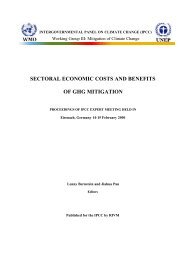Pacific Islands Environment Outlook - UNEP
Pacific Islands Environment Outlook - UNEP
Pacific Islands Environment Outlook - UNEP
You also want an ePaper? Increase the reach of your titles
YUMPU automatically turns print PDFs into web optimized ePapers that Google loves.
55<br />
Chapter Four<br />
Emerging<br />
Issues<br />
This final chapter identifies some issues that are likely<br />
to dominate the environmental agenda over the next 25<br />
years, and links these to some of the global trends that<br />
are already making their effects felt in the <strong>Pacific</strong>. It<br />
poses some of the questions that are specific to the<br />
region, and that may not arise elsewhere.<br />
Globalization and economic reform<br />
‘Globalization’ of the world economy and related trade<br />
liberalization is expected to have a profound effect on<br />
<strong>Pacific</strong> island economies. In response to ‘globalization’,<br />
the region’s Economic Action Plan (1996) sets out<br />
measures to stimulate investment and job creation.<br />
These were outlined in the ‘Policy background’ section<br />
of Chapter Two, Policy Responses, and are designed to<br />
maximize the benefits to the region from potentially<br />
greater global travel, trade and tourism.<br />
A wide range of environmental issues for island<br />
countries are expected to stem from increased travel,<br />
trade and tourism. The more obvious include the impact<br />
of invasive species, diseases and the question of wastes,<br />
as discussed earlier. More subtle are the pressures from<br />
corporate interests to gain access to genetic resources<br />
that may have medicinal or other commercial value. As<br />
noted previously, no local legislation has been put in place<br />
to give effect to the provisions on intellectual property<br />
rights in the Convention on Biological Diversity. This is<br />
discussed in more detail below.<br />
External economic fluctuations, more influential for<br />
small and open economies, will increase the problems<br />
of environmental management. In assessing the impacts<br />
of the 1997–98 economic downturn in the Asian region,<br />
for example, experts have concluded that the <strong>Pacific</strong><br />
island economies, like other SIDS, are characterized by<br />
a high degree of vulnerability (Forum Secretariat 1998).<br />
For a general treatment of the situation of small states<br />
and the possible development of an index of<br />
vulnerability, see Commonwealth Secretariat (1998).<br />
This same description has been used in environmental<br />
reports on the region for many years and in studies on<br />
the effect of natural disasters (see, for example,<br />
UNDP/UNDHA 1996, 1997). The new element is the<br />
growing interaction between globalization as a force in<br />
the <strong>Pacific</strong> region and the wide spectrum of ecological<br />
pressures that most countries are experiencing.<br />
The process of public sector reform and economic<br />
restructuring necessary to maximize benefits to the<br />
region will also bring with it challenges and opportunities<br />
for environmental protection and sustainable<br />
development. Rapid deregulation, combined with a loss<br />
to private firms of skills formerly available in the public<br />
service, are expected to alter approaches to capacitybuilding<br />
and mechanisms used to ensure environmentally<br />
sound practices.<br />
Sound environmental policy will therefore require<br />
two additional elements:<br />
●<br />
a proper assessment of long-term and downstream<br />
risks;

















